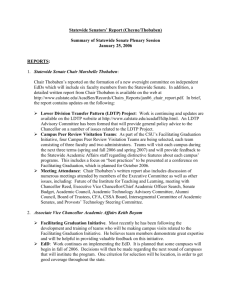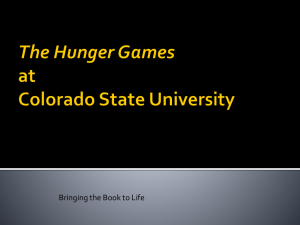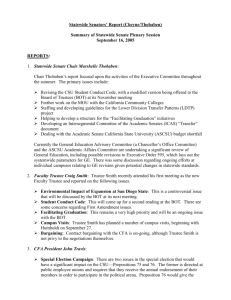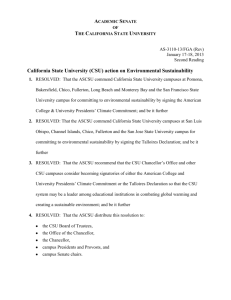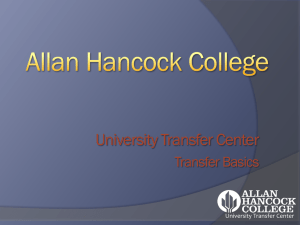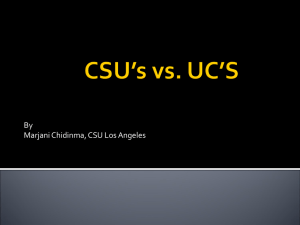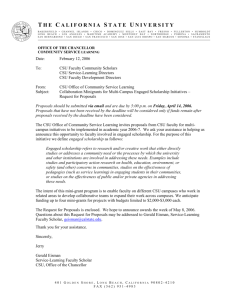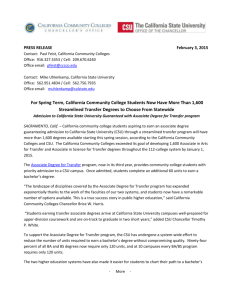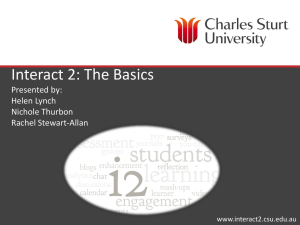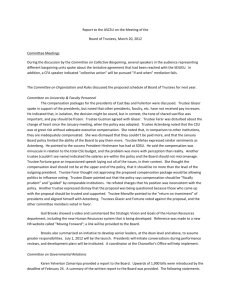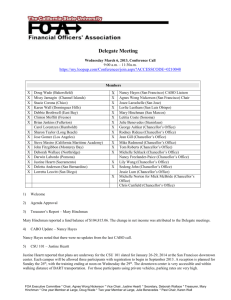academic senate california state university
advertisement
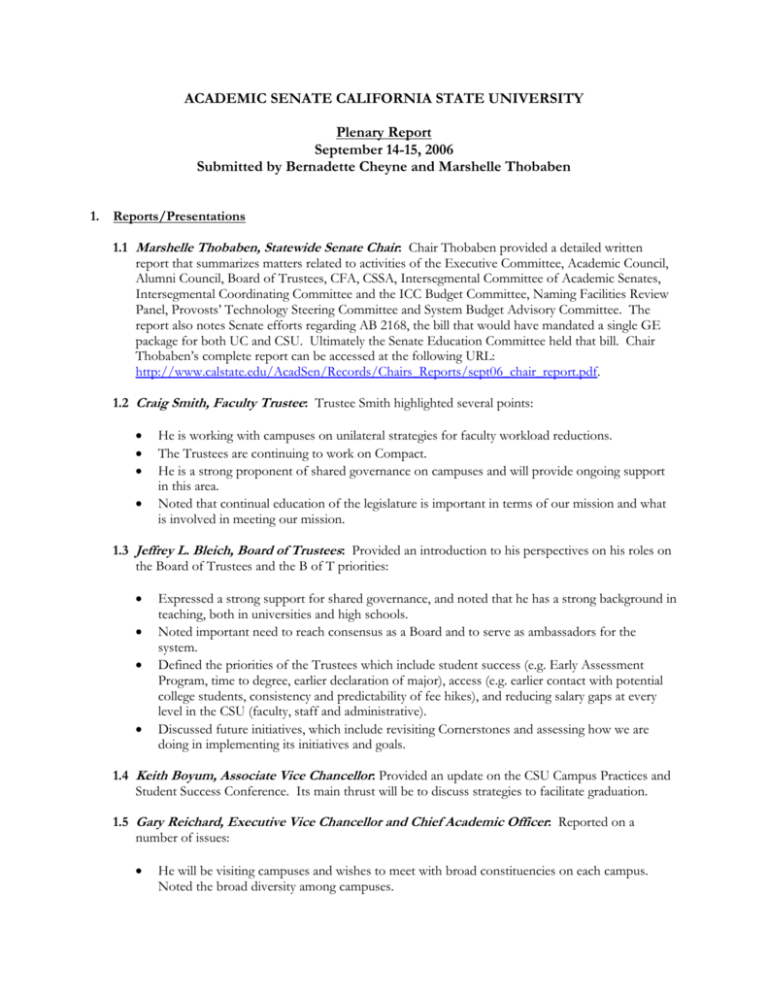
ACADEMIC SENATE CALIFORNIA STATE UNIVERSITY Plenary Report September 14-15, 2006 Submitted by Bernadette Cheyne and Marshelle Thobaben 1. Reports/Presentations 1.1 Marshelle Thobaben, Statewide Senate Chair: Chair Thobaben provided a detailed written report that summarizes matters related to activities of the Executive Committee, Academic Council, Alumni Council, Board of Trustees, CFA, CSSA, Intersegmental Committee of Academic Senates, Intersegmental Coordinating Committee and the ICC Budget Committee, Naming Facilities Review Panel, Provosts’ Technology Steering Committee and System Budget Advisory Committee. The report also notes Senate efforts regarding AB 2168, the bill that would have mandated a single GE package for both UC and CSU. Ultimately the Senate Education Committee held that bill. Chair Thobaben’s complete report can be accessed at the following URL: http://www.calstate.edu/AcadSen/Records/Chairs_Reports/sept06_chair_report.pdf. 1.2 Craig Smith, Faculty Trustee: Trustee Smith highlighted several points: He is working with campuses on unilateral strategies for faculty workload reductions. The Trustees are continuing to work on Compact. He is a strong proponent of shared governance on campuses and will provide ongoing support in this area. Noted that continual education of the legislature is important in terms of our mission and what is involved in meeting our mission. 1.3 Jeffrey L. Bleich, Board of Trustees: Provided an introduction to his perspectives on his roles on the Board of Trustees and the B of T priorities: Expressed a strong support for shared governance, and noted that he has a strong background in teaching, both in universities and high schools. Noted important need to reach consensus as a Board and to serve as ambassadors for the system. Defined the priorities of the Trustees which include student success (e.g. Early Assessment Program, time to degree, earlier declaration of major), access (e.g. earlier contact with potential college students, consistency and predictability of fee hikes), and reducing salary gaps at every level in the CSU (faculty, staff and administrative). Discussed future initiatives, which include revisiting Cornerstones and assessing how we are doing in implementing its initiatives and goals. 1.4 Keith Boyum, Associate Vice Chancellor: Provided an update on the CSU Campus Practices and Student Success Conference. Its main thrust will be to discuss strategies to facilitate graduation. 1.5 Gary Reichard, Executive Vice Chancellor and Chief Academic Officer: Reported on a number of issues: He will be visiting campuses and wishes to meet with broad constituencies on each campus. Noted the broad diversity among campuses. 2 Discussed his work with the Academic Council, which includes campus provosts. They have put together a white paper on graduate education that will go to the Senate Executive Committee for comment. It then will be disseminated to campuses as an aid in managing their graduate programs. Academic Council is also looking at the changing role of research in the CSU and some feedback to campuses should result from this. They are also putting together a task force to discuss international education which will include faculty and student representation. The issue of academic technology is being seriously discussed and the Council will work with the Academic Technology Advisory Committee (ATAC) to discuss strategies. The Council is also seriously looking at the quality of undergraduate programs, and indicated that campuses have not made a great deal of progress on assessment of such programs. Next week the Trustees will be considering a successor planning strategy to Cornerstones. A steering committee will be appointed consisting of 10 trustees, 8 faculty members, 9 presidents, 2 provosts, 1 VPAA, six community partners, and 2 student representatives elected by CSSA. The two major issues to be addressed are student access and success, and academic excellence. They wish to get broad reactions from all the campuses on certain key issues. This will take the form of structured dialogue on each campus related to certain issues that will allow for parallel response from all of the campuses. Faculty, staff, students and administrators will participate in these campus discussions. Ultimately, results from these discussions will be compiled and given to the steering committee to assist in developing a draft plan. Campuses will have the opportunity to respond to this draft. A completion date of Spring 2008 is anticipated. 1.6 John Travis, CFA President: Offered a report on a number of bargaining issues: Noted the episodic nature of the bargaining process and that this tends to slow things down. An entire week was set aside at the end of July that allowed for prolonged talks. Substantial progress was made on a number of articles, including sabbatical leaves, appointments and grievances. Difficulties arose surrounding the CSU administration’s salary proposal. The CFA wants to address, at least to some extent, all the issues surrounding the salary structure, including compression, inversion and the CPEC gap. The CFA counter proposal pretty much ended discussion that week. After the July meeting, the union applied to and received permission from HEERA to declare impasse. After several conversations with Vice Chancellor for Human Resources Jackie McClain and the bargaining consultant who has been hired by the system, C. Richard Barnes, it was decided to come back to the table and the CSU would make another salary offer. This offer showed enough significant movement that there will be continued discussion and a probable counteroffer from the CFA. Returning to the table will allow for discussion of other items including workload, parking and FERP. 1.7 Chancellor Reed: Chancellor Reed’s comments included the following highlights: Discussed the high profile of the CSU nationwide. Believes that the budget from the Compact is good, although it could be better. Noted success in gaining the graduate differential. Marginal cost was finally adjusted which gave the system an additional $13 million, but that will have to be negotiated again next year. CSU finally has been placed in a position to manage its own funds, rather than the funds being managed by the State Treasurer. This means that the CSU can operate electronically which will be more efficient and economical. In our next budget request to the legislature, the system intends to ask for $60+ million dollars beyond the Compact. About half of that will be for compensation to close the CPEC gap. The other half will be for student services, including facilitating graduation. Noted that an education bond will be on the ballot (1D) that would provide the CSU with $345 million. However, the cost of construction is extremely high, so this money will not go very far 3 in meeting the real needs. Given the current state fiscal situation, including the cost of gas, early voter polls do not bode well for any of the bonds. Discussed the current initiative to renew the strategic plan (Cornerstones), and wants the new plan to give greater emphasis to educational quality. Regarding executive compensation, a web site has been created that provides information on this topic. The Chancellor’s Office continues to work on communication, especially in terms of getting the word out about the CSU to public school children and their parents. A poster and brochure will be printed in six languages and distributed across the nation. 2. Election of Search Committee to Select Nominees for Faculty Trustee The following senators were elected to serve on a search committee to recommend nominees for the Faculty Trustee position: Harold Goldwhite (Emeritus), Chair Darlene Yee-Melichar (San Francisco) James Wheeler (Maritime) Jacinta Amaral (Fresno) Calvin Caplan (East Bay) Plus two additional representatives, one from San Diego and one from Dominguez Hills, to be selected by the campuses 3. Resolutions 3.1 Support for Proposition 1D – The Facilities Bond. Supports Proposition 1D, the Education Facilities: Kindergarten-University Public Education Facilities Bond Act of 2006. Commends the CSU Trustees for their support of this proposition. Calls upon campus senates, students, staff and friends of the CSU to support Proposition 1D. FIRST READING WAIVED. PASSED UNANIMOUSLY. 3.2 Laboratory Science Requirement for Freshman Admission. Recommends that the CSU version of the high school course preparation pattern (A-G) be revised such that two units (years) of laboratory science be required, that both courses must be chosen from category “D” on the UC list of approved college preparatory courses, that at least two of the three core disciplines of science be represented, and that a minimum grade of “C” must be earned in each course. FIRST READING. 3.3 Review and Transparent Disclosure of CSU Executive Compensation. Acknowledges the current commitment by the CSU B of T and Chancellor to transparency in B of T actions and openness to the examination of executive compensation policies. Encourages the B of T and Chancellor to undertake a comprehensive review of executive compensation policies. Encourages the B of T and Chancellor to be as transparent as possible in disclosing the range of awards in executive compensation packages. FIRST READING WAIVED. PASSED WITHOUT DISSENT.
